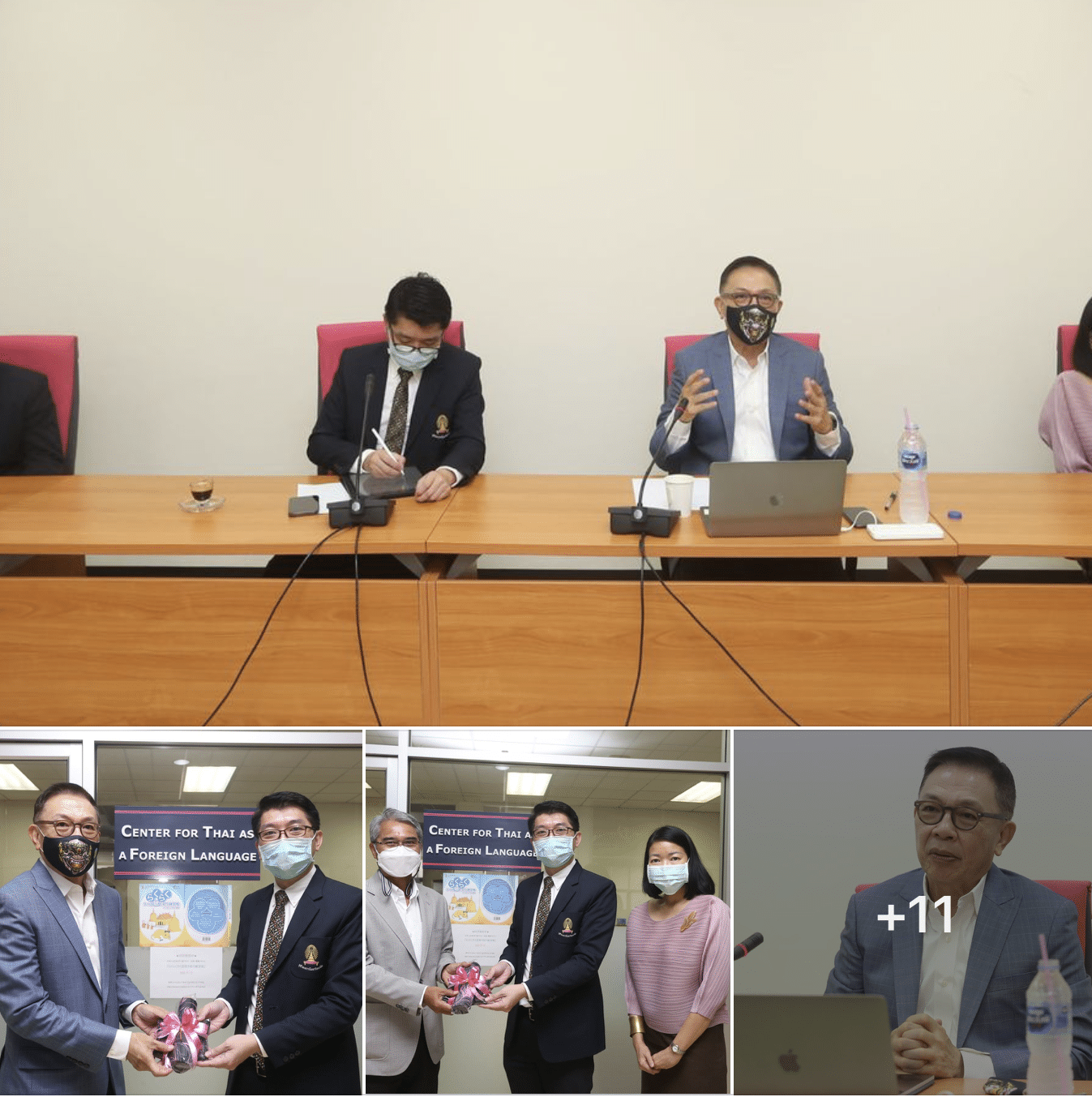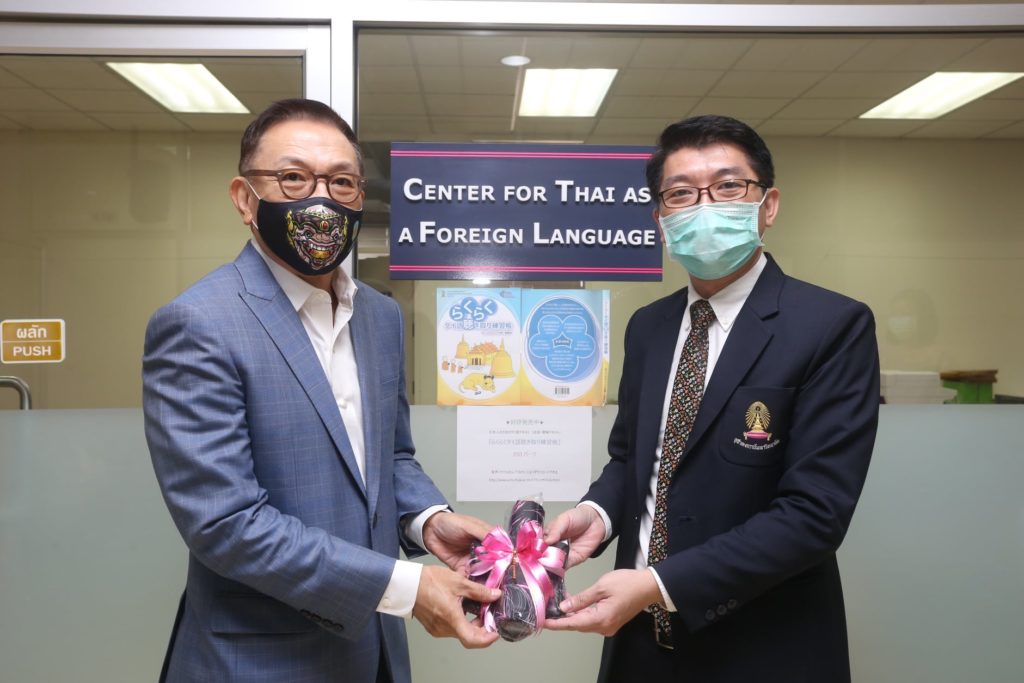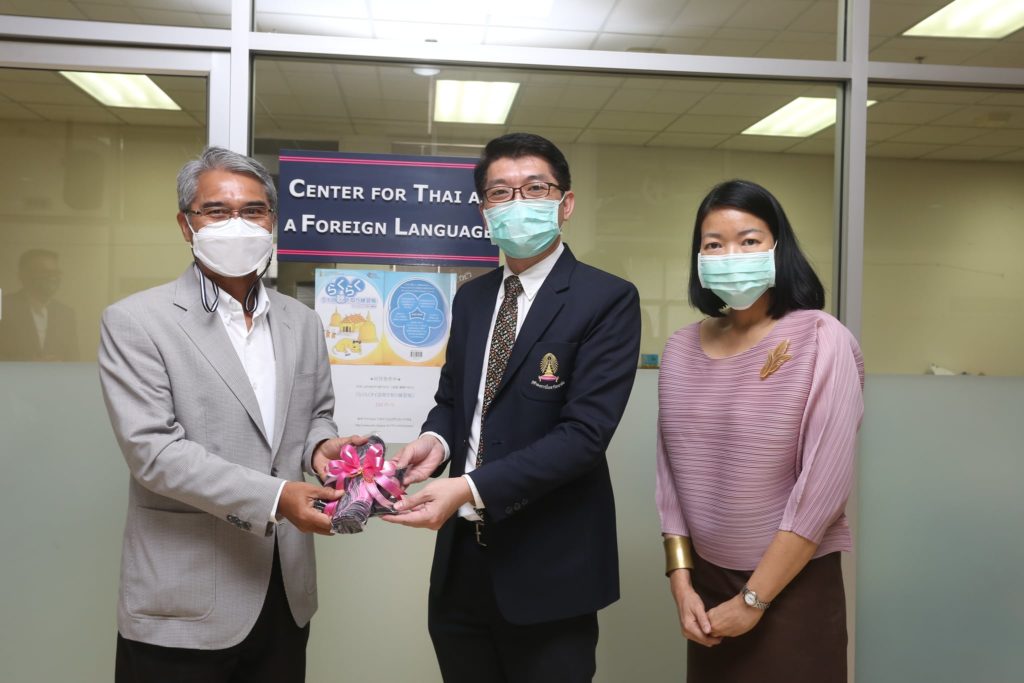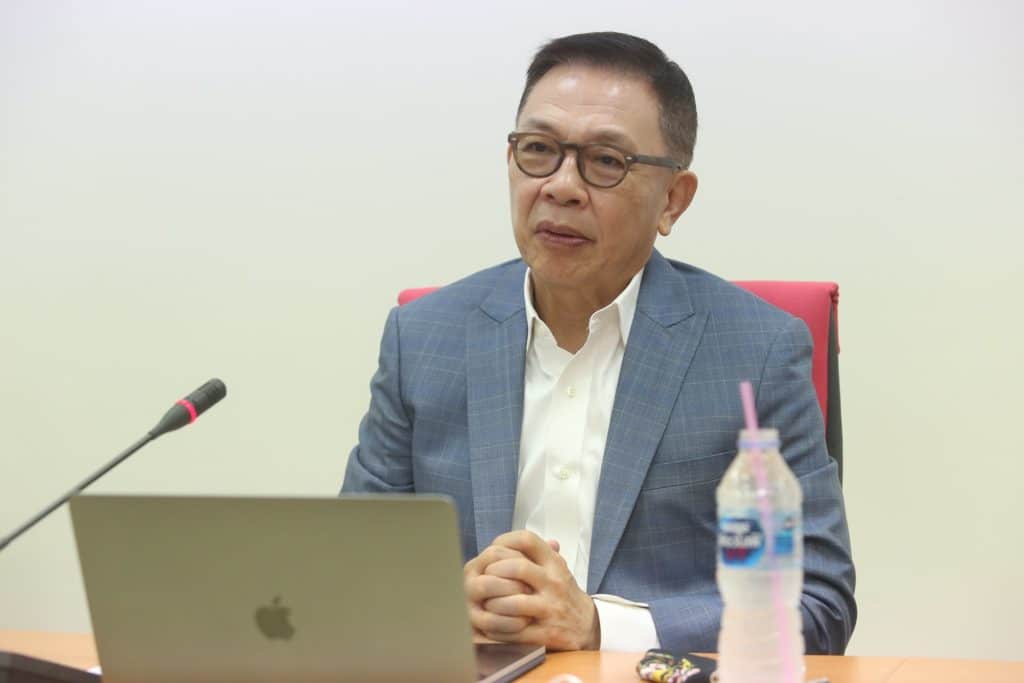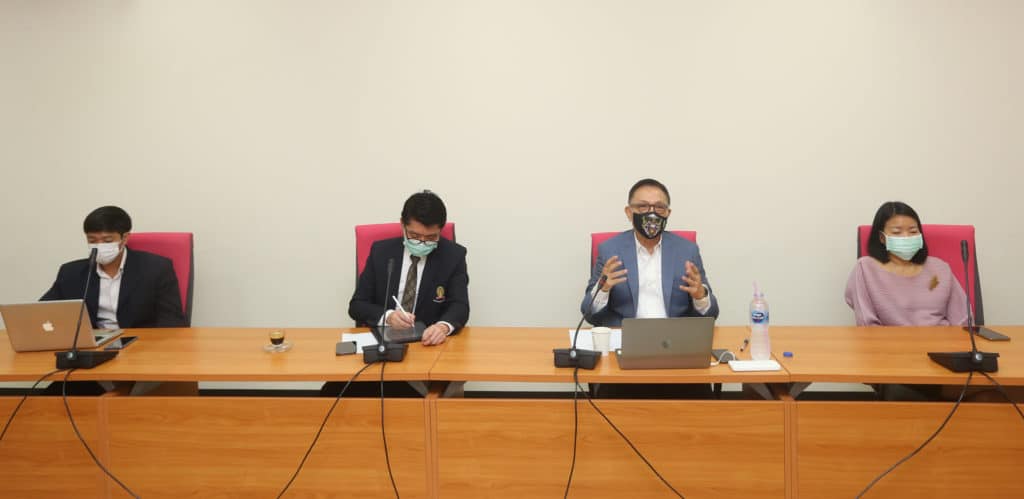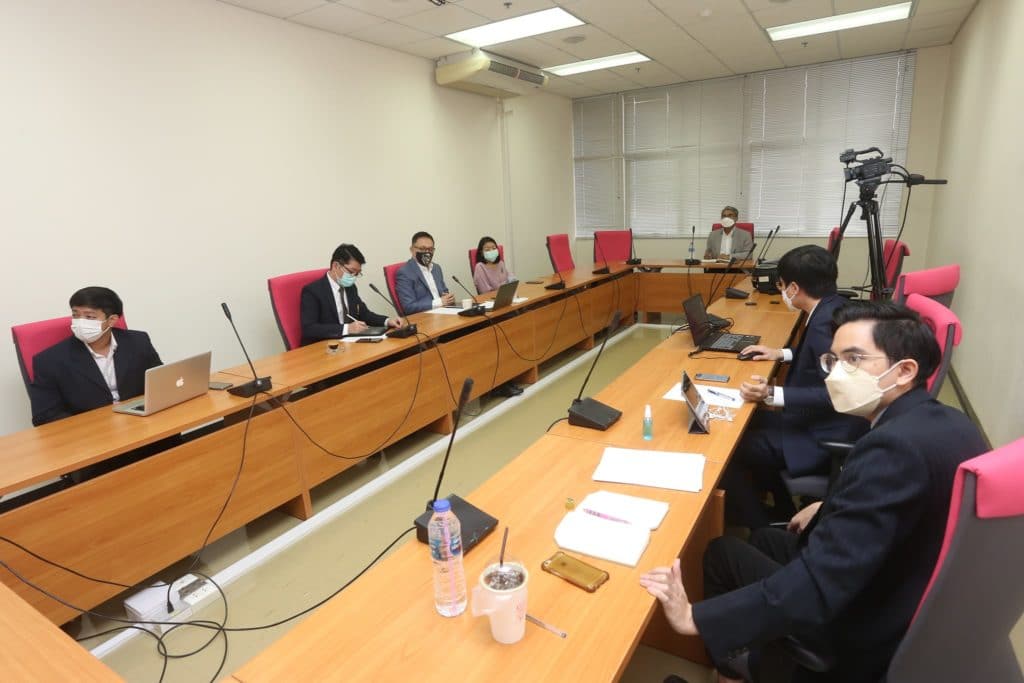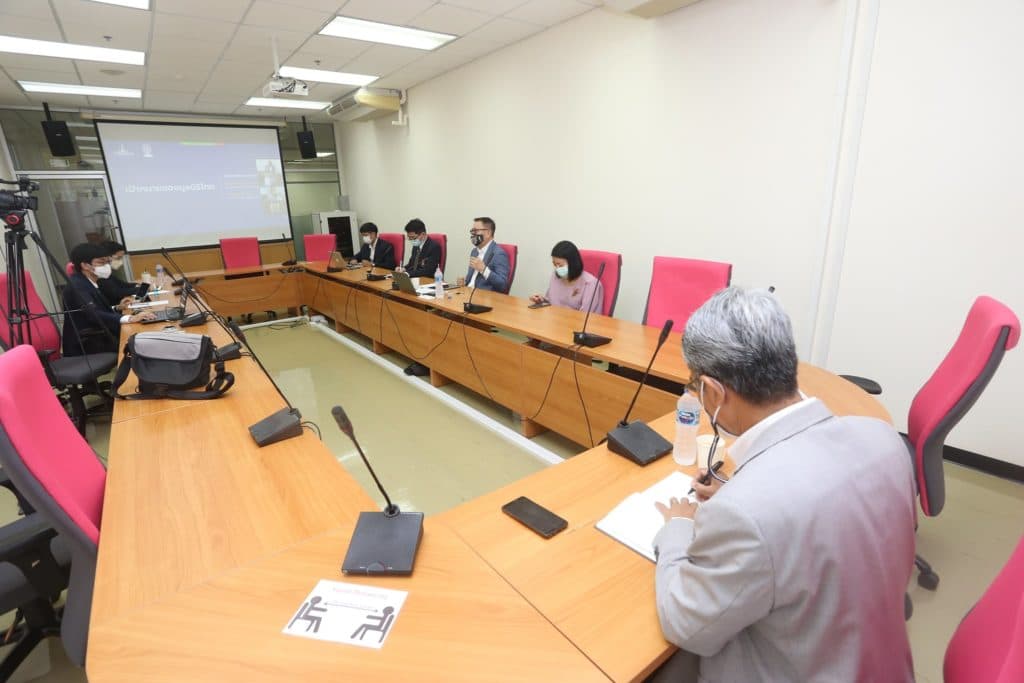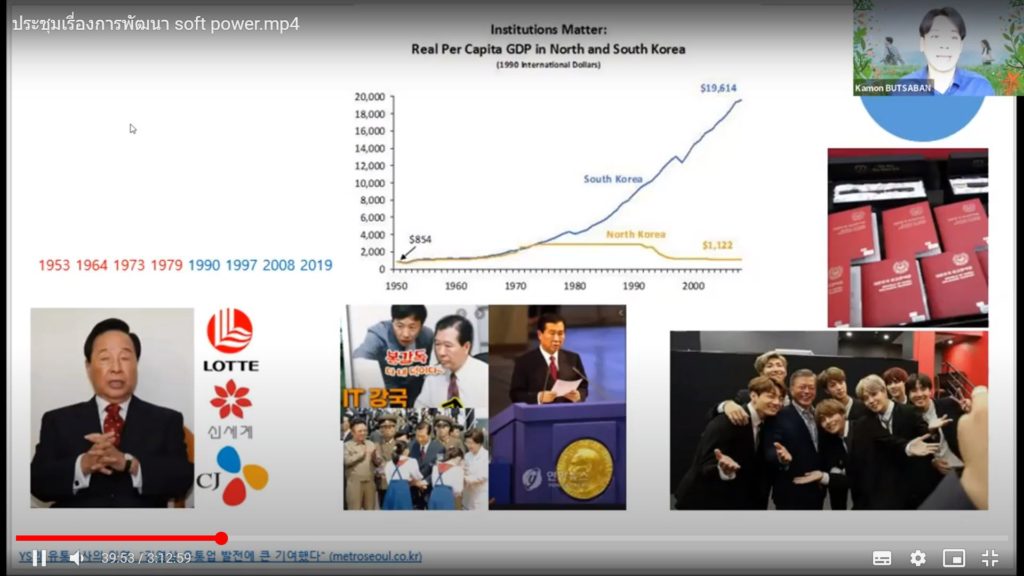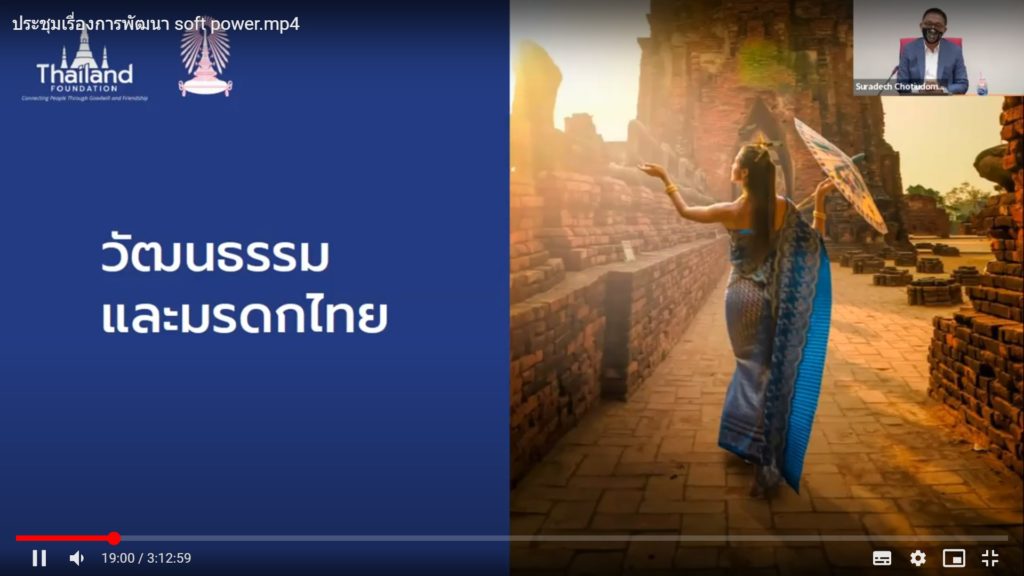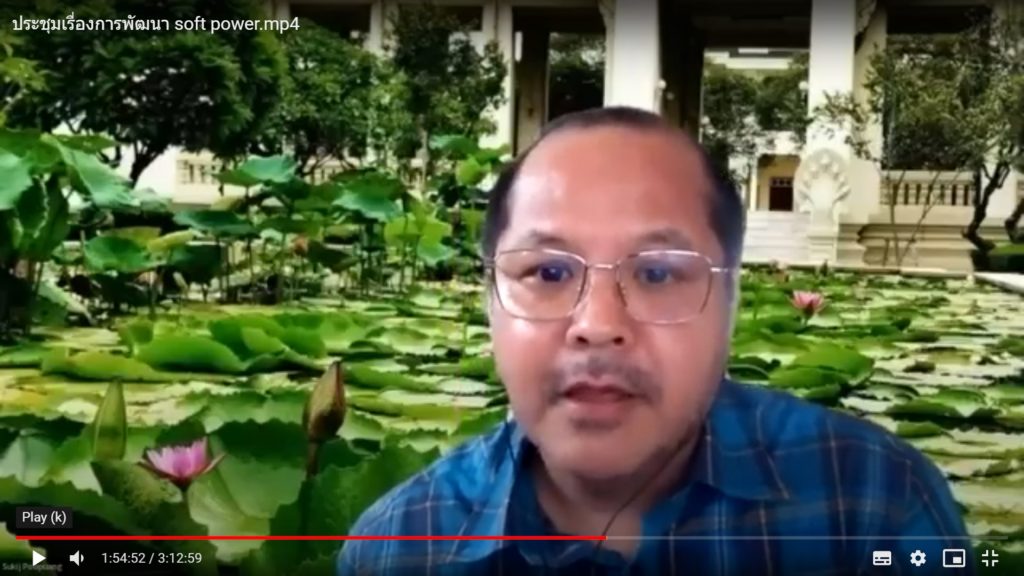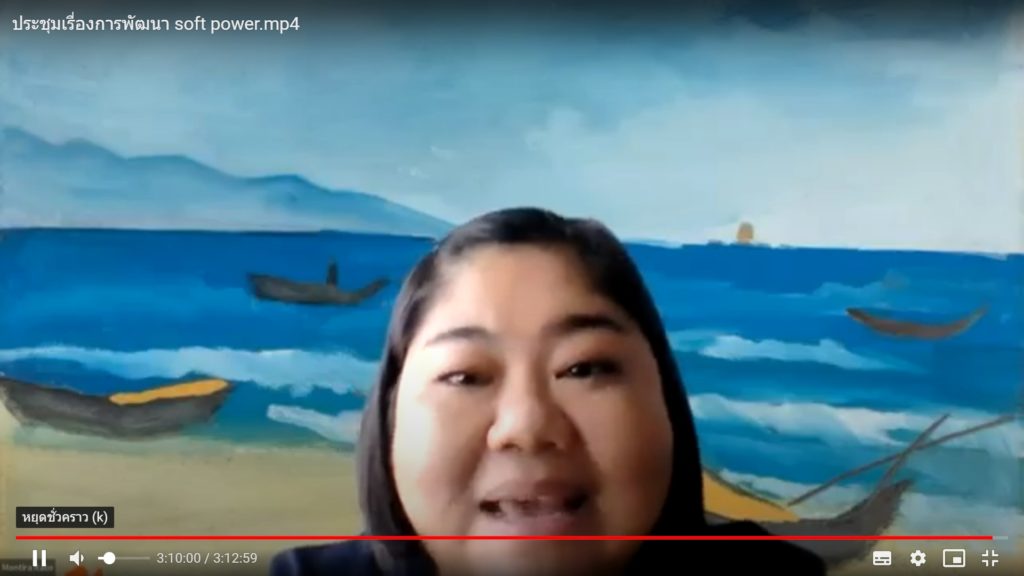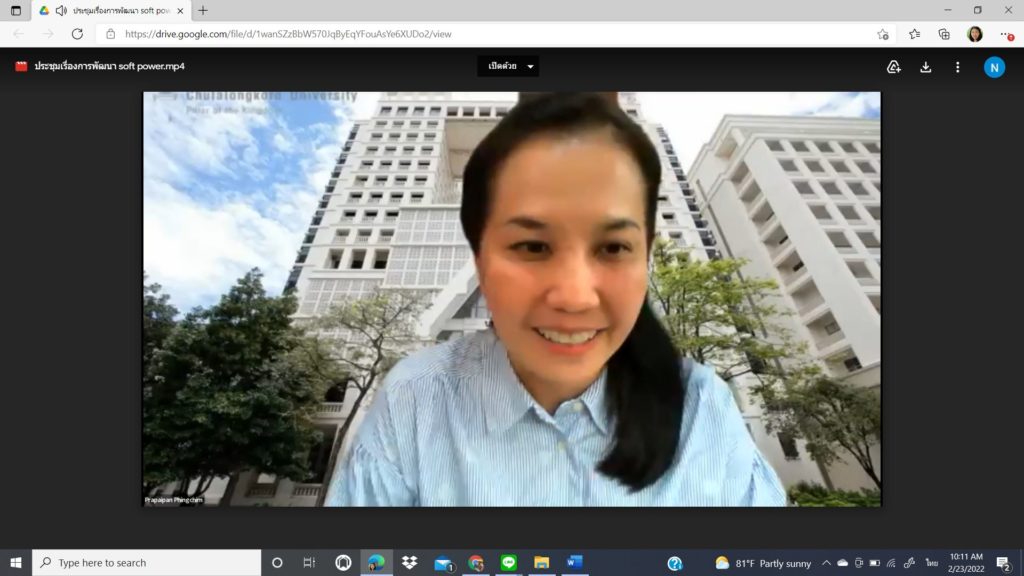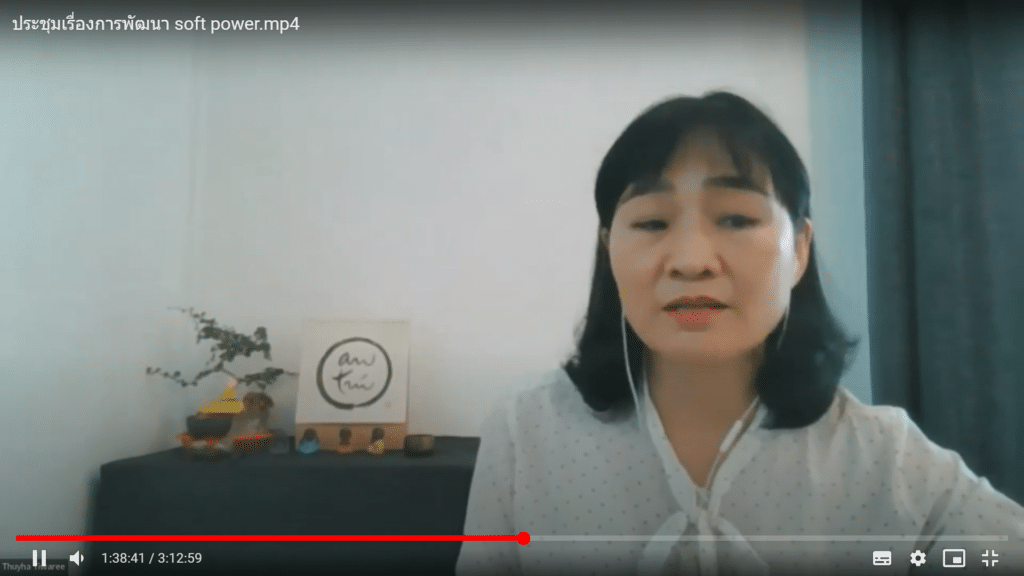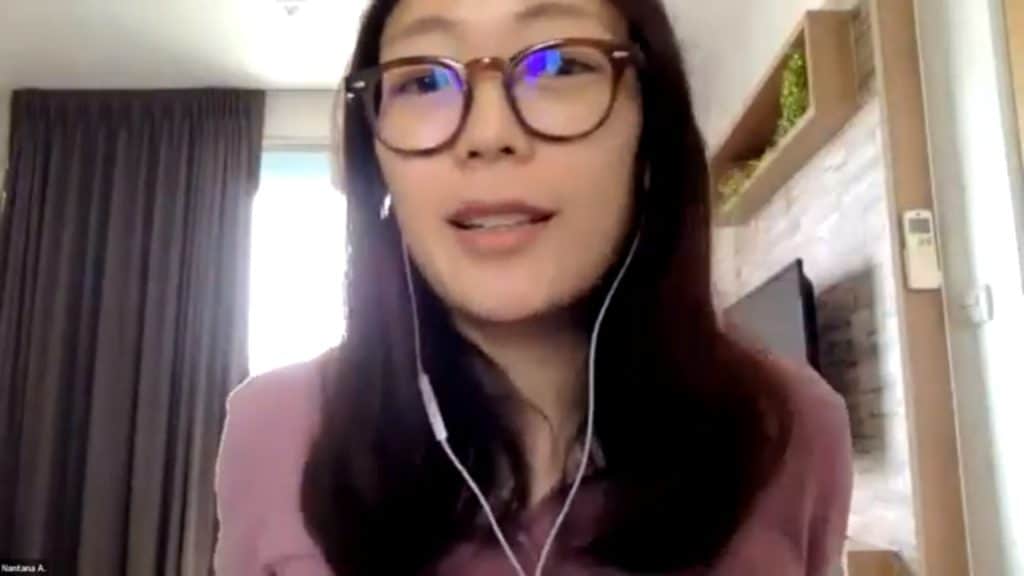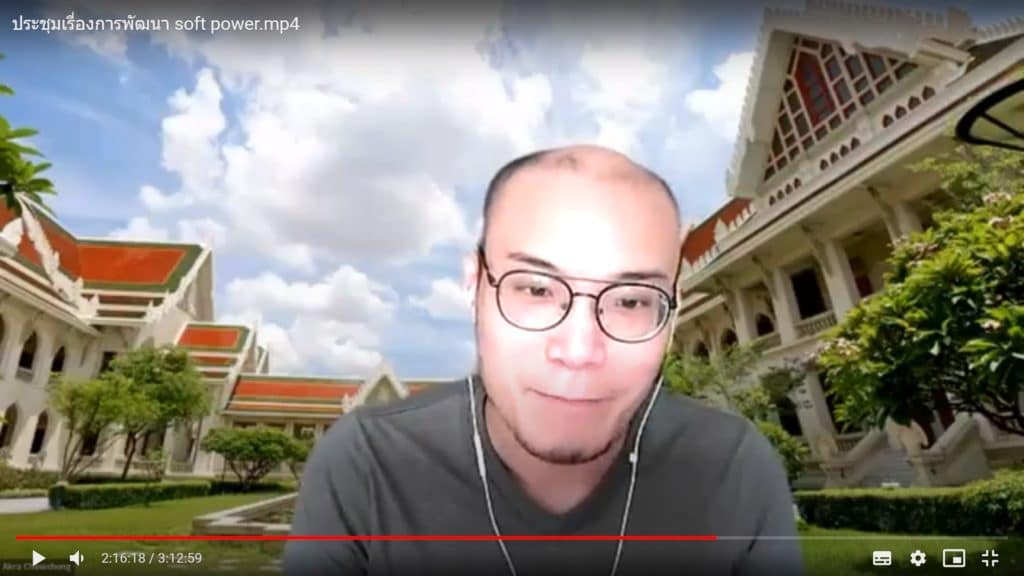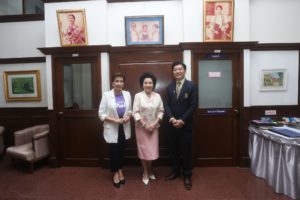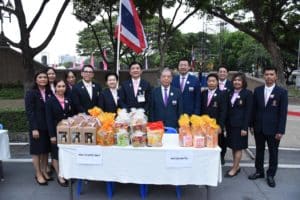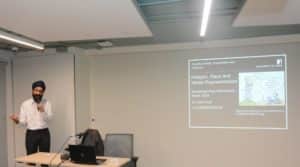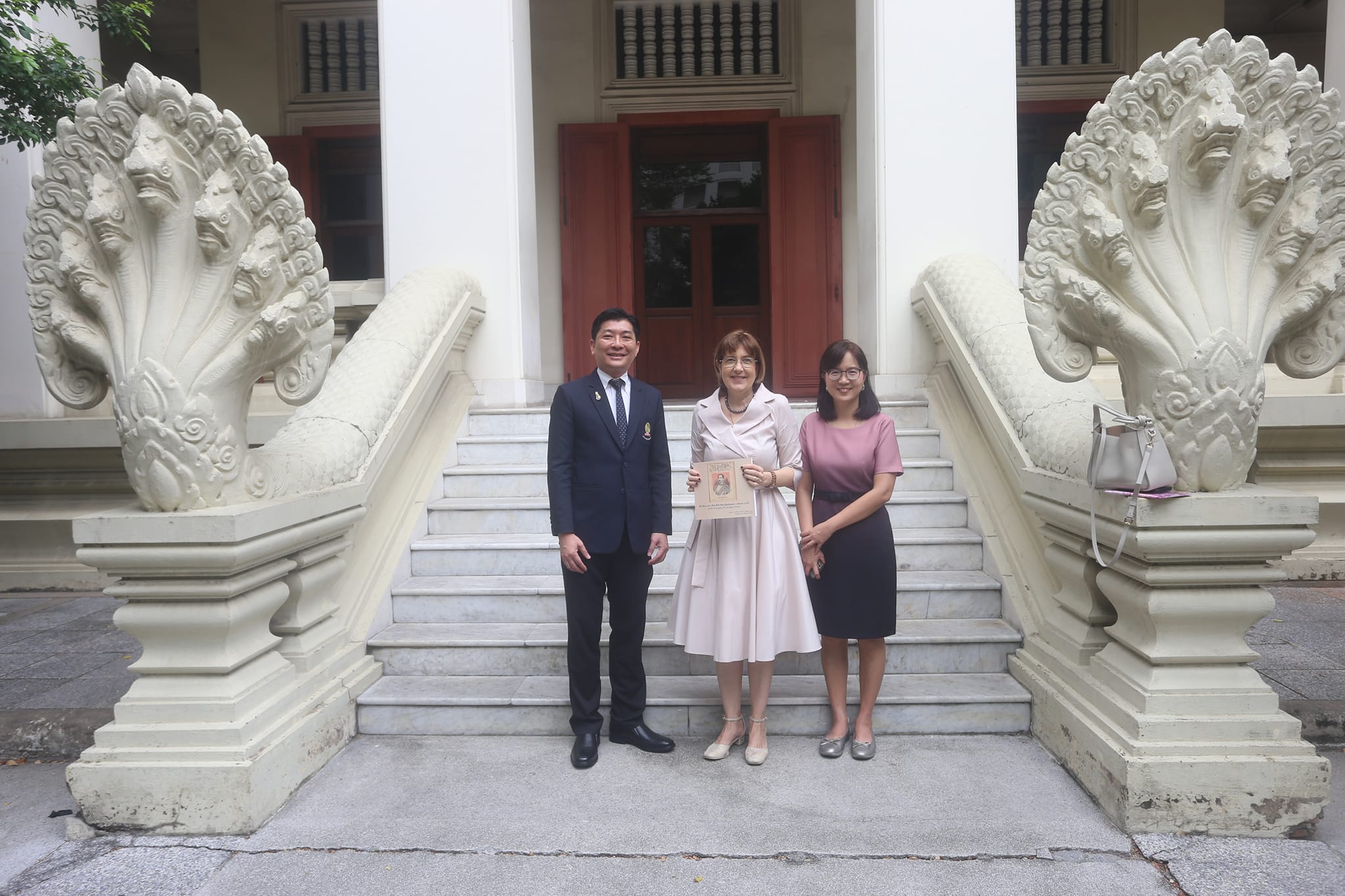“Soft Power” Meeting with Thailand Foundation On Friday, February 10, 2022 the Faculty of Arts was honored by the visit of delegates from Thailand Foundation led by Secretary-General of Thailand Foundation Tharit Charungvat and Foundation Director Paitoon Songkaeo, together with Tayud Mongkolrat and Nasak Pongsri, project staffers. Joining the meeting with Dean, Associate Professor Suradech Chotiudompant, were Associate Dean Assistant Professor Nirada Chitrakara, Assistant Deans, Assistant Professor Sukij Poopuang and Akara Chaochong, CTFL Director Kiat Thepchuaysuk, as well as Associate Professor Montira Rato, Kamon Butsaban, and Thuy Ha from the Department of Eastern Asian Languages, Assistant Professor Prapaipan Phingchim from the Department of Thai, and Nantana Anuntkosol from the Department of Western Languages.
The meeting format was blended, online-onsite, to conform to the University’s COVID-19 precautionary measures. To improve Thailand’s economic situation through Thai positive images, Thailand Foundation wishes to strengthen Thailand’s soft power. The purpose of the visit was, thus, to exchange ideas with some of the faculty staff who had experienced various aspects of Thailand in a variety of contexts to form strategies to boost Thailand’s soft power. The topics included the definition of soft power, an example of a success story, Thailand’s existing soft power, and strategies to reinforce Thailand’s soft power. Mr. Charungvat clarified that soft power refers to “the intangible power” arising from a country’s image as opposed to “hard force”, as in military and economic powers (Roll 2021).
South Korea is a current example of a country with strong soft power. Dr. Butsaban, an expert in Korean Wave, asserted that South Korean government makes exporting Korean culture and popular culture a priority. The attempt results in the country’s global popularity in the sphere of the cultural economy exporting pop culture (Roll 2021). To achieve the above, censorship laws were banned providing freedom in showcasing controversial topics. This, in turn, opens up opportunities for the young generation to express bolder ideas (Roll 2021). Dr. Butsaban added that singers of different races were included in Korean singing groups to reach audiences of different nationalities. In addition to entertainment industries, Korean language education is highly supported. Language lessons were made learner friendly to attract foreign language students.
The above success makes Korean cultural products better and more successfully connect with people around the world. Many things “Korean” acquire positive images. Korean brands are welcomed by people of all ages and nationalities. The presentation by Dr. Butsaban paved way to the discussion on Thailand’s existing soft power abroad. Mr. Charungvat stated that Thailand Foundation plans to focus on Thailand’s strength in the global community. In Germany, Dr. Anuntkosol from the German Section said that in Berlin, there is a park where Thai people gather and set up Thai foods stalls, which is a major attraction for the locals in Berlin. Dr. Chaochong, also from the German Section, expressed that in Germany, the word Thai was added to dishes with Asian ingredients to help the sales. He also added that the market for Thai food ingredients and ethnic products is growing. Among the Spanish, according to Dr. Poopuang from the Spanish Section, Thailand’s plastic surgery is considered the best. Thailand’s soft power grows stronger in Asia. According to Dr. Rato and Thuy Ha, lecturers of Vietnamese language and culture, Thai herbal balms are also widely preferred. Surprisingly, Thailand is famous for its amulets.
The Vietnamese as well as the Chinese believe that Thai amulets bring good fortune and help ward off dangers. Thai Buddhist image amulets are highly sought in China. To attract foreign consumers, Dr. Pingchim suggested that Thai designs can appear on product packaging, such as cosmetics which can be souvenirs. With regards to Thai pop culture, it was reported that the Chinese form a huge fan base for Thai TV series, movies, popular songs, and even commercials. With their comical nature, Thai commercials are found entertaining, while light-hearted Thai movies and TV series are easy to digest. Moreover, Thailand’s Y series were found entertaining, educational, and eye-opening for our Asian neighbors. Consequently, many foreign Thai pop fans are motivated to learn Thai language and culture to understand Thai entertainment. Thai language classes are gaining popularity not only among Chinese, but also Filipinos, Indonesians, Malaysians, Germans, and even Latin Americans, said Dr. Thepchuaysuk, Director of CTFL.
At the moment, online classes facilitate the enrollment of Thai language classes by foreign students in faraway countries. Dr. Chitrakara added that Thai soft power is reflected in interests in attending Arts Chula Summer Program in Thai Language and Culture. The program has been well-attended annually by students from Japan and Taiwan, even when it was online. Dr. Chitrakara proposed that the area that Thai culture has not yet been widely popularized internationally, however, is Thai literature. At present, English language readers are craving for non-western English language pieces with settings in exotic countries such as those in Asia. It is considered another perfect opportunity for Thailand to exert its soft power if Thai novels were to be written English. Unfortunately, translation of Thai novels and literature into English still requires additional support. With all the possibilities presented here by the faculty staff, Thailand Foundation has offered to financially support any promising proposed project that will bolster Thai soft power in the global arena.
To further connect with foreigners, Mr. Charungvat suggested focusing on stories about foreign settlements in Thailand such as the Dutch in Holland Village in Ayutthaya. Dr. Chitrakara mentioned the story of B. Grimm and Co., a German Company in Thailand, which would be presented by Associate Professor Trisilpa Boonkhajorn for Goethe University in Frankfurt the week after. In the Foundation’s attempt to promote Thai positive values, they are now organizing a 2-day program to familiarize expatriates in Thailand with Thai culture. The program involves well-known and respected speakers and experts from various sectors in Thailand with the highlight being dinner at a famous Michelin star restaurant. The amicable meeting was a fruitful one with friendly exchanges of experience and productive ideas for promising projects.
The Secretary-General appreciated our active collaboration and complimented that the Foundation received many constructive inputs from the meeting. Finally, the Faculty of Arts would like to thank Secretary-General Tharit Charungvat and his team for the honor given us by their visit to our institution. Both parties are looking forward to working together in the collaborations to come. Thailand Foundation, part of the Ministry of Foreign Affairs, promotes collaboration and mutual understanding between Thailand and the global community by exploring areas of cooperation based on mutual interest. It supports international harmony through academic and cultural exchanges through goodwill and friendship. Its main goal is to promote Thai culture and heritage and positive values of Thai-ness. References Roll Martin. 2021. Korean Wave (Hallyu) – The Rise of Korea’s Cultural Economy & Pop Culture. October 2021.
Korean Wave (Hallyu) – The Rise of Korea’s Cultural Economy & Pop Culture
https://www.thailandfoundation.or.th/?fbclid=IwAR1VgIc8FMoSOzEjWp-D6vJ7g3_Lv4QTMU8SqBlpYVLWAByDNCb0ot_wufU

